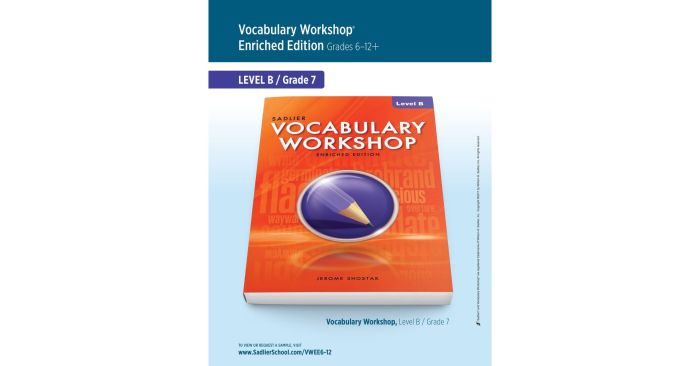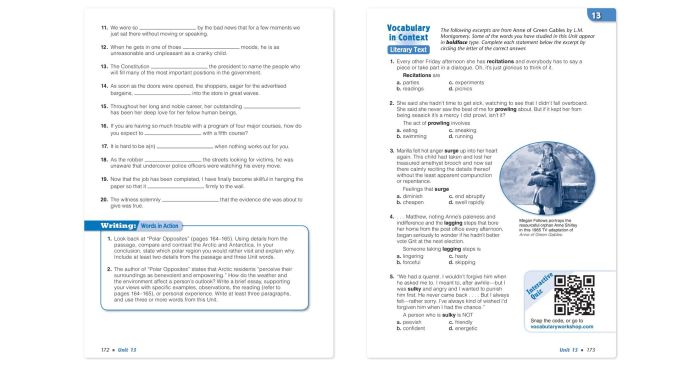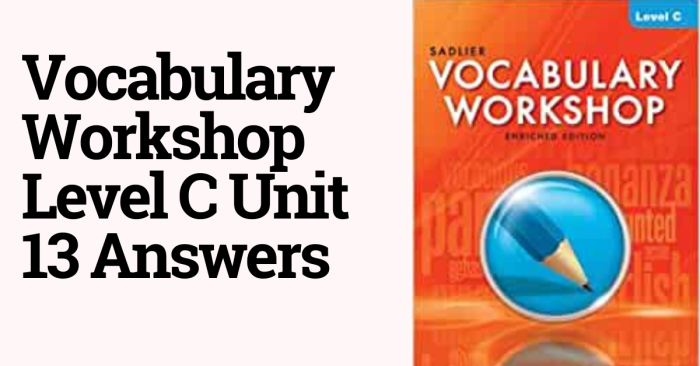Vocabulary Workshop Unit 13 Level E embarks on an educational journey to equip students with robust vocabulary skills, fostering their ability to express themselves effectively and comprehend complex texts. This unit delves into proven vocabulary building techniques, contextualizing vocabulary, exploring word relationships, and leveraging technology to enhance vocabulary development.
Through engaging activities, students will expand their vocabulary, improve their understanding of word meanings, and develop strategies for incorporating new words into their daily communication. By fostering a deep understanding of vocabulary, this unit empowers students to become confident and articulate communicators.
Vocabulary Building Techniques

Vocabulary building is a crucial aspect of language learning. It enhances communication skills, comprehension, and critical thinking abilities. Effective vocabulary building methods for students include:
Utilizing context clues, engaging in word games, and employing mnemonic devices are proven techniques for expanding vocabulary. Additionally, incorporating new words into daily speech and writing reinforces their retention and usage.
Incorporating New Words into Daily Use
To effectively incorporate new words into daily use, students should:
- Make a conscious effort to use the new words in conversations, emails, and essays.
- Keep a vocabulary journal to track new words and their meanings, regularly reviewing them for reinforcement.
- Read widely, exposing themselves to diverse vocabulary in various contexts.
- Engage in discussions and debates, actively seeking opportunities to employ new words and expand their vocabulary.
Contextualizing Vocabulary

Understanding words in context is crucial for effective communication. By examining the surrounding words and sentences, readers can infer the meaning of unfamiliar words, even without explicit definitions.Context clues provide valuable insights into word meaning. For example, synonyms, antonyms, examples, and comparisons can help clarify the significance of a term.
Additionally, the tone and register of the text can provide further context.
Teaching Contextual Inference
Educators can employ various techniques to teach students how to infer meaning from context. One effective strategy is to present students with unfamiliar words in meaningful passages. Encourage them to read the surrounding sentences and identify any clues that might help them determine the word’s meaning.Another
approach involves providing students with a list of context clues and asking them to practice using them to infer the meaning of unfamiliar words. By repeatedly applying these techniques, students can develop their ability to understand words in context and expand their vocabulary.
Word Relationships: Vocabulary Workshop Unit 13 Level E
Understanding word relationships is crucial for expanding vocabulary and enhancing language comprehension. These relationships include synonyms, antonyms, homophones, and homographs, which offer valuable insights into the nuances of language.
By exploring these relationships, learners can grasp the interconnectedness of words and develop a deeper understanding of their meanings and usage.
Synonyms
Synonyms are words that have the same or similar meanings. They provide alternatives for expressing ideas without repetition and can enhance the precision and richness of language.
- Example: happy, joyful, delighted
Antonyms, Vocabulary workshop unit 13 level e
Antonyms are words that have opposite meanings. They create contrast and emphasis in language, allowing writers and speakers to express opposing viewpoints and highlight differences.
- Example: hot, cold
Homophones
Homophones are words that sound the same but have different meanings and spellings. Recognizing homophones helps learners avoid confusion and use words correctly in context.
- Example: there, their, they’re
Homographs
Homographs are words that have the same spelling but different meanings or pronunciations. Understanding homographs requires attention to context and careful analysis of word usage.
- Example: lead (noun) vs. lead (verb)
Strategies for Teaching Word Relationships
Effective teaching of word relationships involves:
- Providing clear definitions and examples
- Engaging students in interactive activities
- Using games and puzzles to reinforce understanding
- Encouraging students to create their own word lists and use them in writing
Vocabulary Games and Activities
Incorporating vocabulary games and activities into the learning process can enhance student engagement and retention. These activities provide a dynamic and interactive way for students to practice and apply new vocabulary in a fun and meaningful context.
Categorizing Vocabulary Games and Activities
To effectively design and implement vocabulary games and activities, it is important to categorize them based on skill level. This ensures that the activities are appropriately challenging and engaging for students at different levels of vocabulary proficiency.
Table of Vocabulary Games and Activities
The following table Artikels a variety of vocabulary games and activities, along with their corresponding skill levels and materials needed:
| Game/Activity | Skill Level | Materials |
|---|---|---|
| Word Charades | Beginner | Index cards with words written on them |
| Pictionary | Intermediate | Whiteboard or flip chart, markers |
| Crossword Puzzles | Advanced | Crossword puzzle grids, clues |
| Vocabulary Bingo | Beginner | Bingo cards with vocabulary words, list of words |
| Word Jumbles | Intermediate | List of scrambled vocabulary words |
| Vocabulary Charades | Advanced | Index cards with vocabulary words and definitions |
Technology for Vocabulary Development

Technology has revolutionized vocabulary learning, providing students with engaging and interactive tools to expand their word knowledge. This section explores the use of technology to support vocabulary development, showcasing online tools and apps, and sharing strategies for effective integration.
Online Tools and Apps for Vocabulary Practice
Numerous online tools and apps offer engaging activities for vocabulary practice, including:
- Wordle:A popular game that challenges players to guess a five-letter word within six attempts, providing instant feedback and reinforcing spelling and vocabulary.
- Quizlet:A comprehensive platform offering flashcards, games, and other interactive exercises, allowing users to create their own study sets or access shared materials.
- Vocabulary.com:A website and app that provides a personalized vocabulary-building experience, with daily word lists, quizzes, and adaptive learning features.
- Duolingo:A language-learning app that incorporates vocabulary practice into its lessons, using gamification techniques to motivate learners.
- Memrise:A spaced repetition app that helps users memorize new words through flashcards, quizzes, and games, adapting to their learning pace.
Assessment of Vocabulary Knowledge

Assessing students’ vocabulary knowledge is crucial to evaluate their progress and inform instructional decisions. Various methods can be employed to assess vocabulary, each with its advantages and limitations.
One common method is vocabulary quizzes, which consist of a set of questions that test students’ understanding of specific words. These quizzes can be administered regularly to track students’ progress and identify areas where they need additional support.
Another method is vocabulary tests, which are more comprehensive assessments that typically cover a wider range of vocabulary words and concepts. Vocabulary tests can be used to assess students’ overall vocabulary knowledge and to identify areas where they excel or need improvement.
Projects
Vocabulary projects allow students to demonstrate their understanding of vocabulary in a more creative and engaging way. These projects can include activities such as creating a vocabulary journal, writing a story or poem using specific vocabulary words, or designing a poster or presentation on a particular vocabulary concept.
Using Assessment Data
The data collected from vocabulary assessments can be used to inform instructional decisions and provide students with feedback on their progress. This information can be used to:
- Identify students who need additional support in vocabulary development
- Plan differentiated instruction to meet the needs of all students
- Provide students with specific feedback on their strengths and weaknesses
- Monitor students’ progress over time
FAQ Insights
What are the key concepts covered in Vocabulary Workshop Unit 13 Level E?
This unit focuses on vocabulary building techniques, contextualizing vocabulary, exploring word relationships, and leveraging technology for vocabulary development.
How does this unit help students improve their vocabulary?
Through engaging activities, students expand their vocabulary, improve their understanding of word meanings, and develop strategies for incorporating new words into their daily communication.
What are the benefits of incorporating technology into vocabulary development?
Technology provides interactive and engaging tools that can enhance vocabulary practice, making learning more enjoyable and effective.